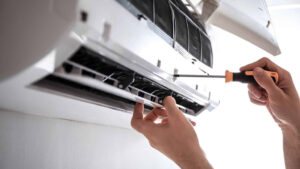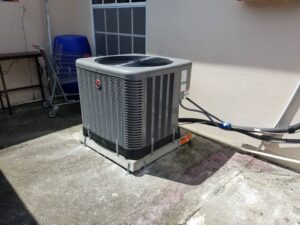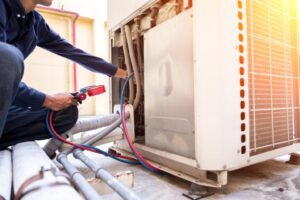Introduction to AC Maintenance
For homeowners, the air conditioning system is not merely a luxury, but an essential component of comfortable living, especially during the sweltering summer months. Yet, many neglect the regular upkeep of their AC units, often leading to diminished performance and unexpected breakdowns. Understanding the significance of routine AC maintenance is crucial, not just for ensuring operational efficiency but also for extending the lifespan of the unit.
AC maintenance encompasses a variety of tasks, each designed to optimize the system’s performance. From cleaning or replacing filters to checking the refrigerant levels, every aspect contributes significantly to the overall health of the unit. When filters are clogged or dirty, airflow becomes obstructed, forcing the system to work harder, thereby consuming more energy and heightening the risk of damage.
Moreover, regular maintenance can prevent minor issues from escalating into major repairs. For instance, an unchecked refrigerant leak might lead to compressor failure, a costly problem that could have been avoided with routine inspections. Not only does maintenance safeguard the unit’s functionality, but it also contributes to better indoor air quality, ensuring that the air circulating within your home is clean and free from pollutants.
Ultimately, investing time in understanding and implementing AC maintenance best practices is a wise decision for any homeowner. By doing so, one can enjoy a cooler home environment, reduce energy bills, and avoid the inconvenience and expense of unexpected repairs.
Importance of Regular AC Maintenance
Regular air conditioning maintenance is not merely a routine task but a critical component in ensuring the longevity and efficiency of your AC system. An air conditioner, much like any other mechanical system, requires periodic check-ups to function optimally. Regular maintenance can significantly extend the lifespan of your unit, preventing premature wear and tear. This, in turn, saves homeowners from the unnecessary burden of expensive repairs or even complete replacements.
Moreover, an efficiently maintained AC unit contributes to better energy efficiency. When all components are cleaned and functioning correctly, the system uses less energy to cool your home, which translates to lower utility bills. This is particularly crucial during peak summer months when energy consumption tends to spike. By investing time and resources into regular check-ups, homeowners can ensure their air conditioning units operate at maximum efficiency, thus reducing their carbon footprint.
Regular maintenance also plays an essential role in enhancing indoor air quality. Over time, dust, dirt, and other pollutants can accumulate within the AC system, potentially affecting the air you breathe. Regular cleaning and filter replacement ensure that the air circulating in your home remains fresh and free from contaminants. This is especially important for households with individuals who suffer from allergies or respiratory issues.
In essence, committing to regular AC maintenance is a wise decision that offers numerous benefits, from financial savings to health improvements, fostering a comfortable living environment year-round.
Understanding the Components of an AC System
To effectively maintain your air conditioning (AC) system, it’s essential first to familiarize yourself with the various components that make up this complex yet crucial household appliance. Understanding these components not only aids in routine maintenance but also empowers you to identify potential issues before they escalate into costly repairs.
The Evaporator Coil
The evaporator coil is located indoors and is responsible for absorbing heat from the air inside your home. As warm air passes over the coil, the refrigerant inside absorbs the heat and cools the air, which is then circulated back into your living spaces.
The Condenser Unit
Sitting outside your home, the condenser unit works in tandem with the evaporator coil. It releases the absorbed heat into the outside air, allowing the refrigerant to cool and return to the evaporator to repeat the cycle. Ensuring that this unit is free from debris is vital for its optimal performance.
The Compressor
The compressor is essentially the heart of your AC system. It pumps the refrigerant between the evaporator and condenser coils, ensuring the continuous flow necessary for efficient cooling. Any irregular noise from the compressor can indicate a problem needing immediate attention.
The Fan
Fans in both the indoor and outdoor units circulate air over the coils. Regular cleaning or replacement of fan blades is crucial to maintain airflow and efficiency. A malfunctioning fan can lead to inadequate cooling or increased energy consumption.
By understanding these primary components and their functions, homeowners are better equipped to conduct routine inspections and minor maintenance tasks, ensuring the longevity and efficiency of their AC systems. This foundational knowledge also facilitates more informed discussions with HVAC professionals when professional intervention is necessary.
Steps for Basic AC Maintenance
Maintaining your air conditioning unit is not only crucial for ensuring its longevity but also for optimizing its performance. With a few simple steps, homeowners can keep their AC units in top shape, ensuring a comfortable indoor climate year-round.
1. Regular Filter Cleaning and Replacement
The filter is an essential component of your AC unit, responsible for trapping dust, pollen, and other airborne particles. Over time, filters can become clogged, reducing airflow and efficiency. It is advisable to check the filter every month during peak usage periods and clean or replace it as necessary. A clean filter not only improves air quality but also lowers energy consumption.
2. Inspect and Clean the Condenser Coils
The condenser coils are located outside the unit and can accumulate dirt, leaves, and other debris. This accumulation can hinder the heat absorption process. Inspect the coils annually and clean them with a soft brush or a vacuum cleaner to maintain efficient operation. Be sure to clear any debris from around the unit to ensure proper airflow.
3. Check the Thermostat Settings
Ensure that your thermostat is functioning correctly and set to the desired temperature. Consider upgrading to a programmable thermostat for enhanced control over your home’s climate, enabling you to optimize energy usage when you’re away.
4. Schedule Professional Tune-Ups
While many maintenance tasks can be performed by homeowners, it is beneficial to schedule a professional tune-up at least once a year. HVAC technicians can identify potential issues before they become significant problems, ensuring your system runs smoothly and efficiently.
By following these basic steps, homeowners can significantly extend the life of their AC units and enjoy a more pleasant and energy-efficient home environment.
Tips for Improving AC Efficiency
Enhancing the efficiency of your air conditioning unit not only ensures a comfortable living environment but also contributes significantly to reducing energy consumption and lowering utility bills. By adopting a few strategic practices, homeowners can optimize their AC systems, leading to both environmental benefits and cost savings.
Regular Maintenance and Cleaning
One of the most pivotal steps in maintaining AC efficiency is consistent upkeep. Regularly cleaning or replacing air filters is essential, as dirty filters obstruct airflow, forcing the unit to work harder than necessary. This simple action can improve efficiency by 5-15%. Additionally, keeping the coils clean prevents the accumulation of dust and dirt, which can impede the unit’s ability to absorb heat.
Thermostat Management
Effective thermostat management can significantly impact energy use. Utilizing a programmable thermostat allows for precise control over indoor temperatures, ensuring the AC operates only when needed. Setting the thermostat to a higher temperature when the house is unoccupied can prevent unnecessary energy expenditure. A difference of just a few degrees can result in considerable savings over time.
Seal and Insulate
Ensuring that your home is well-sealed and insulated helps prevent cool air from escaping. Check for any leaks around windows or doors and use weather stripping where needed. Proper insulation keeps the cool air inside, reducing the load on your air conditioning system.
By implementing these practices, homeowners can markedly enhance the efficiency of their air conditioning systems, ensuring a cooler home environment while simultaneously enjoying reduced energy costs. As these tips become part of regular home maintenance routines, the benefits will become increasingly evident, both in comfort and in savings.





